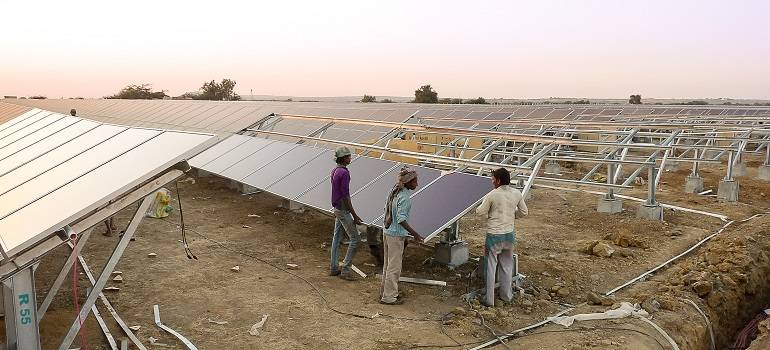
India’s push to generate 160 gigawatts of wind and solar power by 2022 will improve energy security, enhance energy access and help mitigate climate change.
A new World Resources Institute (WRI) report Can Renewable Energy Jobs Help Reduce Poverty in India? finds that India’s clean energy initiatives can also help address poverty in rural communities by providing steady incomes, healthcare benefits and skill-building opportunities to unskilled and semi-skilled workers.
India’s growing renewable energy sector is expected to generate more than 330,000 new jobs over the next five years (2017-2022). The report finds that these opportunities can support India’s rural poor by offering an alternative to subsistence farming. More than 270 million Indians live in extreme poverty, and another 240 million lack basic electricity services today.
“Wind and solar growth can be a win-win opportunity for India, helping the country secure a clean energy future while tackling poverty,” said Bharath Jairaj, Director of WRI India’s energy program and lead author of the report. “But unless decision-makers act, this growth will leave the rural poor behind, unable to attain the thousands of new jobs created. Now is the time for leaders in business and government to build a clean energy sector that delivers electricity and employment to poor communities across India.”
The report also finds that unskilled and semi-skilled workers in rural areas face entry barriers to clean energy employment. Training programs have failed to mitigate these issues. For instance:
- Renewable energy employers interviewed for the study said that unskilled workers lack the technical and soft skills needed to succeed in full-time positions.
- Most training institutes refuse to admit applicants without a secondary school education, locking out the 60 percent of poor Indians who are either illiterate or received just a primary school education.
- Many training programs are in urban centers, far from rural communities where most of India’s poor families live.
- Women face unique, additional gendered challenges. Household duties, childcare obligations and gender norms make it nearly impossible for them to participate in training programs.
“Even when poor Indians overcome obstacles to attend training programs, the institutes’ curricula don’t often align with industry needs, making it difficult for graduates to secure good-quality jobs,” added Pamli Deka, Manager of WRI’s Electricity Governance Initiative and co-author of the report. “In fact, we found that many clean energy employers prefer to train people they hire, because they believe that the training institutes fail to provide the required and relevant skills.”
ALSO READ: India became third largest country for energy investment in 2016: IEA
Based on its findings, the study makes recommendations for government officials, private sector leaders and training institutes to maximize poverty reduction impacts by creating full-time, good-quality jobs in rural communities.
- Private sector leaders should:
- Build the capacity of unskilled and semi-skilled workers to ensure the sustainability of renewable energy projects.
- Give rural communities a sense of ownership in off-grid projects, thereby motivating local workers to maintain the programs and invest in their growth.
- Government officials should:
- Create public training programs that prepare the poor and less educated people — those typically shut out from training institutes and full-time positions – for employment in the clean energy sector.
- Embed poverty impact assessments into project designs, allowing policymakers to collect data and assess the impact of clean energy jobs on poverty reduction.
- Training institutes and civil society organization leaders should:
- Target women and tailor skill-building programs to their specific needs, including location, hours, safety and sanitation.
- Align institutes’ curricula with industry needs and strengthen connections with clean energy enterprises to help graduates secure employment.
ALSO READ: India needs over $200 bn of investment in renewable energy infrastructure
Apart from creating new jobs in the sector, India’s clean energy push can improve energy access in India’s poorest, rural communities, thereby allowing more time for children to study after school, greater productivity and income for families, and improved health outcomes.

